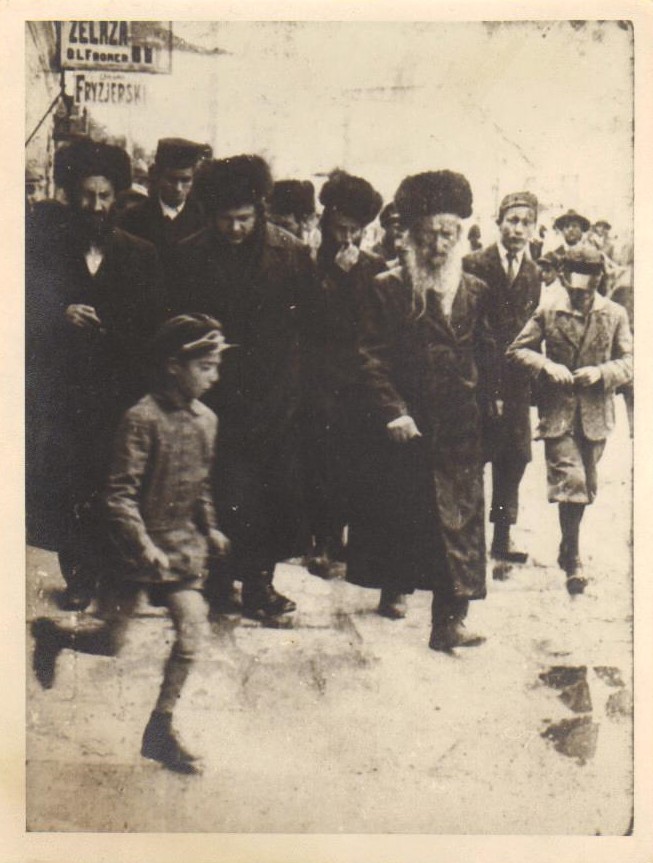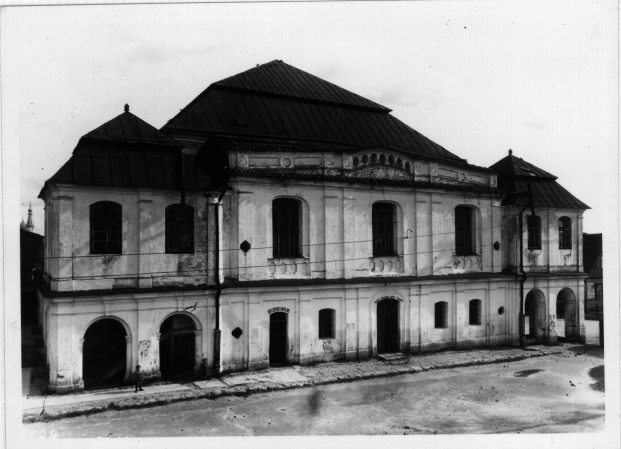“Over These Do I Weep” (Lamentations 1:16)
Av 5, 5785 (July 30, 2025)
By: Yaakov Rosenfeld
This is the testimony of a Jewish boy, alone in his world. A memory as sharp as a razor and as bitter as wormwood. Michael was the man’s name, and this memory did not leave him until his last day.
And why did I decide to present this testimony now? For two reasons. We are now in the period of the Three Weeks (between the fast days of Shiva Asar B’Tammuz and Tisha B’Av), and nothing reflects the destruction of the Jewish People and the Temple more than a story like this. A Jewish home is a temple, the tender children are the cherubim and the holy vessels, and the story of a large and extensive Jewish family, chassidic and pure, of which only one descendant remains and in whose heart such a distant and sad memory resides, is the story of the destruction of the entire Jewish People. But there is another reason.
In our recent article (“The Firmament Resembles the Throne of Glory”, 27.07.2025), we read about tzitzit (ritual fringes worn by Jewish men) that a Holocaust survivor brought with him from the dying Diaspora. With his own hands, he created this tzitzit, whose colourful fabric so expressed the colour of the sky and the sunset in the evening – reddish orange.
This brought us back to the figure of one of the greatest Rebbes in Poland, a magical and awesome legend, for his steadfast stance of holiness and self-sacrifice during the Holocaust, and although we have already written about him several times, it is still not enough.
The holy Radziner Rebbe z”l, may G-d avenge his blood,[1] who was a great proponent of the mitzvah (commandment) of techelet (blye strings in tzitzit) in the years before the Holocaust.

The Rebbe, Rabbi Shmuel Shlomo of Radzin, may G-d avenge his blood
And when, immediately after an entire article on the tzitzit and the Throne of Glory, we find such rare and moving testimony about this world-building righteous man during the days of the terrible Holocaust, we seek out a page and a pen, write with trembling and holy feelings, and publish it for the Jewish People.
Here is the testimony, verbatim
Michael:
…We lived in the village of Kołacze near Włodawa. Our house stood at the crossroads of the Parczew-Lublin-Włodawa roads, and once, in the winter of 1941, at midnight we heard loud voices and knocking on the door and someone said:
“Yankel, open up please, let us in…we came for a very important matter.”
Of course, this surprised us all, but my father immediately recognized the voice of the speaker and opened the door, and there before him stood several dignitaries of the city Włodawa, followers of the Rebbe of Radzin. I remember the names: Weizmann and Mendel. They addressed my father with a request:

“Please, Reb Yankel, host the Rebbe, that he should stay in your home. It is a great merit for you…”
They told how they had managed to smuggle the Rebbe out of Radzin and now had to wait for permission to enter Włodawa,[2] and in the meantime the Rebbe needed some rest.
My mother, Mrs. Faiga, of the Winograd family, immediately got out of bed, turned on the stove, boiled water in a kettle, and prepared to welcome the Rebbe.
At that moment, it seemed to her as if her youth was returning. With great speed, she prepared the refreshments for the Rebbe and his followers.
And while the chassidim were talking to my father, voices and footsteps were heard toward our house, and the chassidim explained:
“The Rebbe is coming!”
The door opened wide and the Rebbe entered, surrounded by a group of chassidim, influential men. From the expressions on their faces and their conversations, which I remember, I sensed the seriousness of the situation.
The Rebbe’s face was wrapped in a white bandage, which he intended to use to cover his beard for fear of the Germans who would cut the beards of the Jews they encountered.
I was a boy, but I had already heard many times about the greatness of the Rebbe, who, out of love for the Jewish People, sacrificed his life for them, even for the simple Jews, and I saw him now immersed in thought and a holy spirit etched on his face, which was full of expression and spiritual nobility.
The Rebbe sighed a heartbreaking sigh, rose to his feet and began to recite verses of the Psalms, and all the chassidim in our house joined in the Rebbe’s prayer.
The sound of prayer at that hour after midnight still resonates in my ears to this day.
For many days and with great anguish, I carried in my heart the image and the voices of the worshippers, the enthusiasm and the sacred fear that gripped all the worshippers. Tears flowed from their eyes and moistened the beards of the chassidim.

The synagogue in Włodawa, Poland
Immediately after the prayer, another delegation of the Rebbe’s followers arrived and they announced that they had concluded negotiations with the Gestapo and had obtained permission for the Rebbe to enter the city of Włodawa.
I remember well the mood that night, how the chassidim began to say goodbye to my parents and my father received his blessing from the Rebbe, while my mother sobbed. The Rebbe understood what was happening in her heart and turned to her and said:
“Mrs. Faiga, I understand your feelings well. Please, calm down and tell me you heart’s desire.”
My mother calmed down for a moment and her words burst from her lips, moving in a whisper because of the pain in her heart:
“Holy Rebbe, it is well known how the murderers mistreat the remaining Jews and who knows what fate awaits us all…”
“I gave birth to and raised nine children, five boys and four girls, and they are now from the ages of four to twenty…”
“Please, Rebbe, give me your blessing that at least one will remain alive to say Kaddish after our death…”
A terrible silence fell in the room. The grieving souls were greatly compassionate, and it seemed to me that they subdued their sighs in their hearts and all crowded together to hear the Rebbe’s blessing, and his lips murmured the blessing in a whisper.
The Rebbe and his chassidim left our house and I saw through the window a convoy of horse-drawn sleighs galloping towards Włodawa.
The bitter and tragic end of the Radziner Rebbe is known to the Jewish People. The Germans persecuted him and murdered him.
My family moved to reside in Adampol and there they were murdered on September 13th, 1943; my parents and my brothers and sisters perished.
And I, the “Kaddish,” survived.
Earth, Oh Earth, do not cover the rivers of our blood!
Source of the testimony: “Zachor” 16
[1] Rabbi Shmuel Shlomo Leiner (Shvat 18, 5679/ February 9, 1909 – Sivan 5702/May 1942). one of the great Rebbes of Poland. Two weeks before war’s outbreak, he closed his yeshiva and sent his students homes, fearing for their fate. The rooms of the yeshiva served as a shelter for refugees. At one point he fled to Włodawa, where he worked to convince people that the Germans were not sending the Jews to work, but to extermination. He attacked the Judenrat for collaborating with the Germans and opposed the handing over of Jewish names to the Germans. He called on Jews to flee to the forests and fight the Nazis. He asked for 50 people to join him in a company that would burn the ghetto and escape to the forest, but he refused. His chassidim tried to save him and sent him money to help him escape, but he refused to leave Włodowa and used the money to bury Jews who were thrown from train cars on the way to the death camps. (Wikipedia)
[2] A county town in the Lublin province. Between the world wars, about 6,500 Jews lived in Włodawa – about two-thirds of its population. They made a living from petty trade and crafts, mainly tailors and shoemakers, and there were also owners of factories and printing houses and owners of agricultural farms near the city. Two Jewish banks, a Gemach fund, and a branch of the T.O.Z. operated in Włodawa.
Zionist parties, the Bund and Agudath Israel, were active in the city, most of whose supporters in the city were Ger chassidim. The parties operated youth movements, libraries, and sports associations on their behalf in the city. The city also had a branch of the ORT education network, a Hebrew elementary school of the “Tarbut” network, and two Agudath Israel schools.
The Germans occupied Włodowa on September 18, 1939. Many young people fled east, across the Bug River. The Jews were separated from the rest of the city, and a few weeks later they were ordered to wear a white armband with the letter J on it – later replaced by a yellow Star of David on their clothing. They were restricted in their movement and were forced to pay a high ransom.
By the beginning of 1940, all Jewish businesses had been confiscated. On April 29, 1940, a 12-member Judenrat was established in Włodowa, headed by I. Sommer. A Jewish order service of 60 people was also established. The Judenrat was required to recruit Jews for forced labour.
On January 17, 1941, the Jews of Włodawa were transferred to the ghetto, and the Judenrat opened a public kitchen and an orphanage there. Włodawa was designated a regional center for the surrounding Jews, and Jews from surrounding villages and towns were brought to its ghetto.
In March 1941, 1,014 deportees from all over Poland were brought to the ghetto, and deadly epidemics broke out there. In early 1942, 40 young men from Włodawa, along with other young Jews from nearby towns, were sent to work in the construction of the Sobibor extermination camp.
In March-April 1942, 800 Jews from Mielica and 1,000 deportees from Vienna were brought to the Włodawa Ghetto.
The first aktion (roundup) in Włodawa took place on May 23 and 24, 1942. Ukrainian police, SS men, and a company of German gendarmes, with the help of Jewish police, deported about 1,300 Jews from the ghetto in freight trains to Sobibor. The refugees from Vienna, children from the orphanage, the sick, the disabled, and the poor were deported first. Numerous Jews were murdered there.
After the aktion, Jews from Siedliszcze and other places were brought to Włodowa.
On October 24-25 and November 6-7, 1942, the 5,400 Jews who remained in the Włodowa Ghetto, both locals and refugees, were deported to Sobibor. Before and during the aktions, some Jews – individuals and families – managed to hide or escape into the forests.
After the November aktion, Wilhelm Krueger, head of the SS and police in the General Governmentt, announced the establishment of a remnant ghetto in Włodawa. About 500 Jews who remained in the area returned to the ghetto and worked in the Włodawa labour camp.
At the end of April 1943, the remnant ghetto was also liquidated, and its inhabitants were deported to Sobibor. Some of the ghetto Jews joined the partisans of the Polish underground organization “Armia Ludowa” who were operating in the area. (Encyclopedia of the Ghettos, Yad Vashem).














